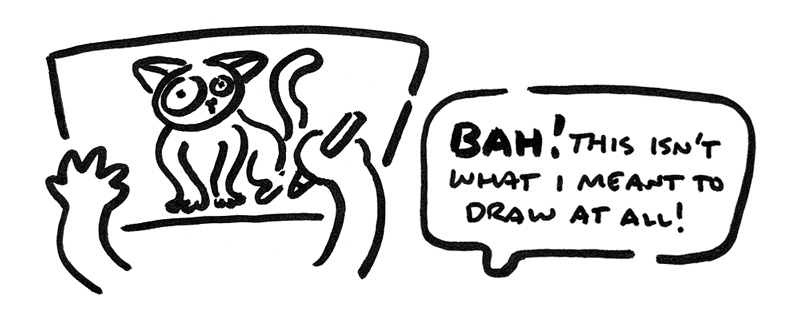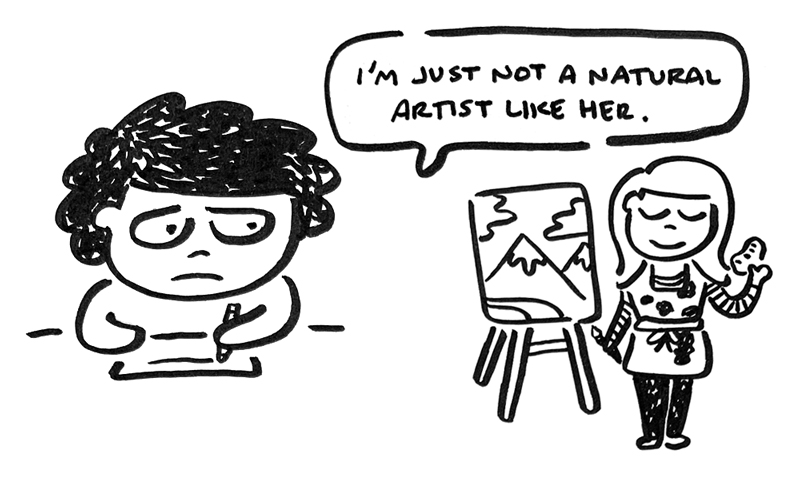
Everyone learning something new is initially going to be bad at it. We all know that’s a fact, right? And yet, we often don’t remember this in the process of learning. We give up when things get challenging. We see other people who seem to pick up new things with ease, and always expect the same from ourselves. We assume that if we’re not as good as good as everyone else from the start, then we’re just not good at that thing. Period.
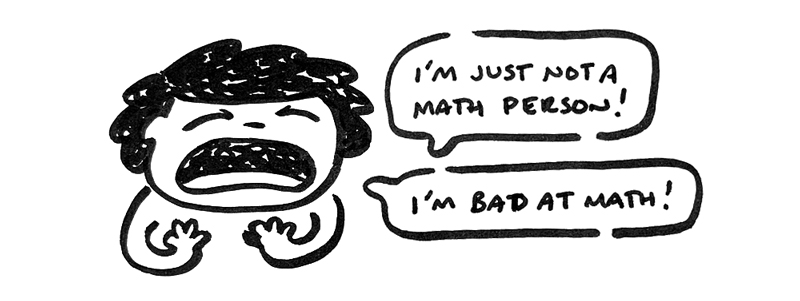
Not a Math Person
When I was young, I was really bad at math. I struggled with learning the concepts and took forever to finish my homework. If it had been an option, I certainly would have quit. During my initial struggles, I began to form a hard belief: I am bad at math, and I will never be good at it—I am just not a math person.
And so, with that belief firmly embedded in my mind, what do you think happened? I continued to struggle, and actually began to struggle even more. I never became “good” at math. I still struggle with it today and get a surge of anxiety when I’m forced to deal with numbers in any way, like say, calculate tip at a restaurant. All because I convinced myself back when I was 10 that I was not a math person. Period.
I know now that I fell into a Fixed Mindset back in the math classroom years ago. And I know now that this Fixed Mindset severely hampered my ability to learn.
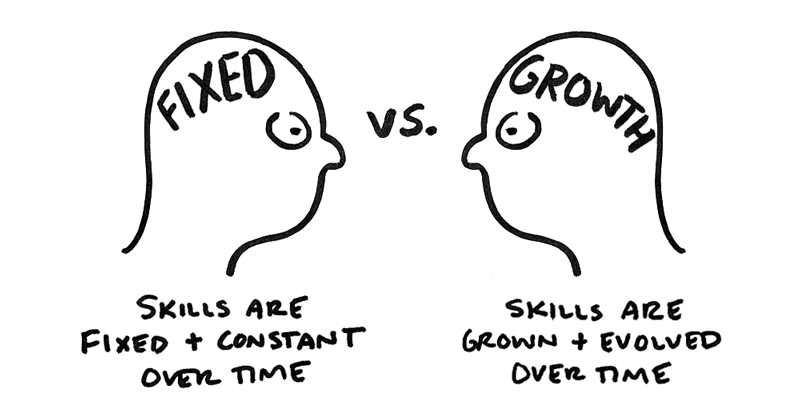
Fixed vs Growth Mindset
With a Fixed Mindset you believe your skills, interests, and talents are all fixed and constant. You are born as a math-person, art-person, sports-person, or people-person. You are someone who can draw or you are someone who cannot. You are what you are, and that’s that.
With a Growth Mindset you believe your skills, interests, and talents grow and evolve over the course of your life. You have the ability to become a math-person, art-person, sports-person, or people-person. You can be someone who cannot draw and you can become someone who can draw. You can grow and evolve, and that’s that.
Growing my skills in art, growing from a person-who-can’t-draw to a person-who-can-draw, and teaching this evolution to other people for the last 5 years has led to some deep realizations about myself. While I had a firm Growth Mindset for my art skills, I had an equally firm Fixed Mindset for my math skills. And I’ve realized that many, many people have similar beliefs about themselves. Perhaps you believe you’re good at art and bad at math. Or perhaps you believe you’re good at math and bad at art.
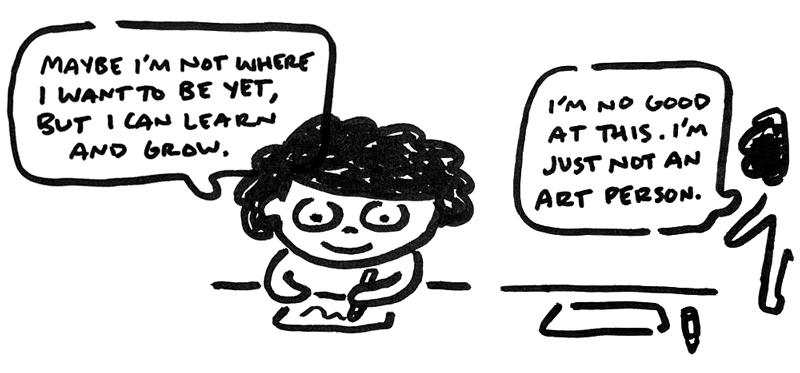
How These Mindsets Play Out
It would be egotistical and unrealistic to believe we should become brilliant masters of everything in the universe. We simply don’t have the time and energy to do so. What about when you believe you’re bad at math, but you need some basic math skills for daily life as an adult? What about when you believe you’re bad at drawing, but you have this drive inside you to be creative?
What about when you’re trying to become good at something, but you truly believe that you will always be bad? How could we possibly improve with that mindset?
This is when the Fixed Mindset becomes a problem. This is when the fear of failure becomes too big to face, when the struggle becomes too big to overcome, and when our tiny steps forward are overseen. This is when we quit.
So if you think you have a Fixed Mindset for drawing (or math or whatever), how can we change? How can we develop a Growth Mindset so we can stop struggling so dang much and begin to evolve and grow?
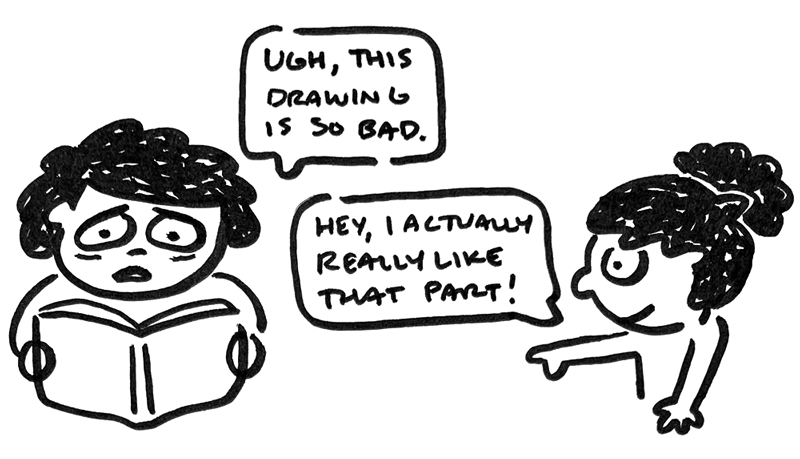
We Need: Encouragement and positivity.
When we’re in a Fixed Mindset, we tend to be extremely hard on ourselves. We beat ourselves up, let our inner critic take over, and get swamped with negative thoughts. “I’m so bad at this”, “Why can’t I just do this”, “Why am I so much worse than everyone else!?”
Eventually, we can get to the point where we’re able to have more positive self-talk and can overcome our inner critic. But when we’re learning something new, we need outside support. We need a person, or ideally a community, who can remind us of the positive things they notice, and encourage us to keep going. I firmly believe that without this, we may improve but never notice it, and lose the motivation to continue. No matter how good we get at drawing, there will always be struggles and obstacles. We have to have a positive community to turn to in those dark moments.
And bonus! Spreading positive comments to others is a great way to practice that language yourself. Giving encouragement to someone else can sometimes also be giving encouragement to yourself. It can be a way to hear that positive inner voice and practice saying it out loud. Soon enough, you’ll be able to give yourself encouragement to supplement help from your community.
We Need: To change how we see mistakes.
In a Fixed Mindset, mistakes are seen as proof that we are bad. If we mess up a drawing we think it’s evidence that we are inherently just not an art-person.
But the reality is that everyone makes mistakes. Whether you’re a master mathematician, a professional artist, or just a lady with a sketchbook—everyone makes mistakes. A mistake is just a slip-up. It’s not a reflection of your entire journey, it’s just whatever happened in that one moment.
And mistakes are an integral part of that journey. Mistakes are how we learn and grow. Mistakes can point us in new directions, and guide us down new paths. If we change how we see our mistakes, they can begin to help us instead of hurt us.
In a Fixed Mindset, a mistake would cause us to curse and quit for the day. In a Growth Mindset, a mistake can cause us to look deeper at what happened. We can approach the mistake with curiosity instead of frustration. Why did this happen? What made this happen? Is it really so bad? Or could it possibly be a happy mistake?
Almost every time I draw something I make a mistake. But that mistake often ends up being a more interesting mark than what I had originally planned. And if I can go with it, and follow it, and give it a chance, the drawing often ends up being more unique, original, and interesting because of that one little mistake. So you spilled some coffee on your drawing? What if you just went with that and made it a part of the piece? What would happen then?
If it’s a true mistake, like drawing wonky eyes, we can learn something from it instead of beating ourselves up. What can this mistake tell us? That we drew the head too small? That we need more room to work with next time? That we need to use a smaller pen?
If we change how we think about our mistakes, they can guide us forward instead of dragging us backward.
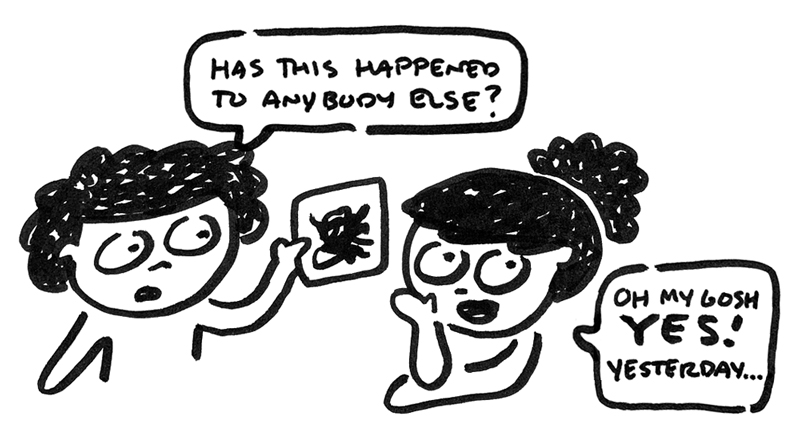
We Need: To share our failures.
In addition to having a community that offers encouragement and positivity, we need a community that embraces failure. We need a group of people that we feel we can share our blunders, mess ups, and failures.
Sharing our failures takes away their power. Say you drew something that in your mind, is quite terrible. If we sit with those thoughts by ourselves, they can eat away at us. And that drawing can turn into another piece of evidence to our minds that we are truly bad at drawing.
But if we share that messed up drawing with a trusted group of fellow artists, the power shifts. We can post the drawing with humor (haha, whew, take a look at this doozy!), with vulnerability (hey, I’m really unhappy with this drawing and am feeling pretty down about myself), or with questions (Something happened here that I don’t understand, has anyone else experienced with this?). We take control and take action, instead of ruminating on the thoughts in our head.
Sharing in this way helps make our failures not such a big deal in our minds, develops intimacy with other artists, and helps us learn new things to continue down our journey. We can give our failures the power, or we can take the power back.
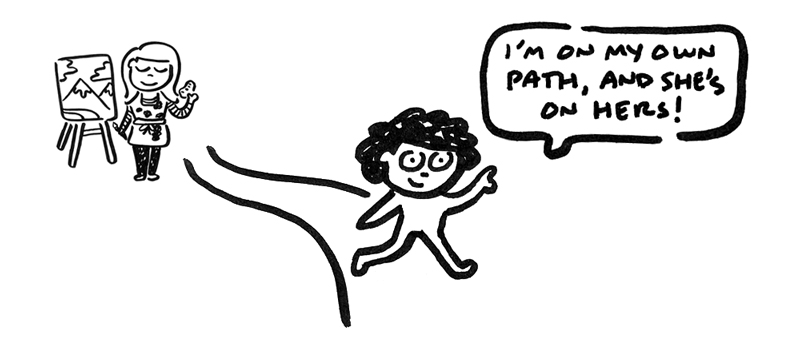
We Need: To trust the process.
Inner-critics, mistakes, failures… all of these are a part of the process of learning something new, and growing our skills. We won’t get over these obstacles quickly, and in fact, parts of them will always be with us. But we can learn how to deal with them more efficiently so they don’t cause such debilitating pain. We can learn to trust the process and see obstacles as just a tiny blip on our journey.
But this all takes time. It may appear that some other people jump straight from not-good to brilliant, quicker than you do. It may appear that some people become masters or professionals over night. But we can only see our own journey, we can’t see others’. We don’t know what they’ve gone through.
We need to be focused on our own path, and above all, we need to be patient. Because learning to draw, growing our art practice, and evolving our artistic style is a lifelong journey. There will not be a day where all your obstacles fade away, you stop making mistakes, and you finally feel like you made it. Making art is a process. It’s about the process.
Lean in, trust yourself, and you can become an art person—you can draw. I firmly believe that.
<3,
Christine

